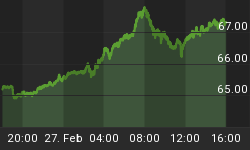The stock market has advanced sharply over the past five years no matter what geopolitical situation has blown up or how tenuous the economic foundation may be. This is because Investors have simply been forced to throw money at the market with a reckless disregard of logic due to the lack of interest provided through the holding of cash.
But if one looks objectively and the true market fundamentals, it is clear to see that the stock market has blown into yet another bubble, except its total magnitude has been masked by the central bank's engineering of corporate earnings growth.
Unfortunately, the sobering truth is stock values are highly extended at this time. And, it is silly to ask the question if these values are justified because of strong earnings growth or because of the Fed's easy money policies--because you can't separate corporate profitability from the record-low interest rate environment provided by the Fed.
The Price to Earnings ratio of the S&P 500 as of this writing is at 19.5. That is about 4 points above historic levels. But, inflated PE's are only part of the story. For most companies in the SP 500, top-line revenue growth has been anemic since the Great Recession ended in 2009. Earnings growth (expected to be 5.4%) is coming primarily from corporate engineering facilitated by the Fed's zero interest rate policy.
There has been so much talk about corporations' pristine balance sheets. But, the truth is non-financial corporate debt is up $3.5 trillion since 2009. Businesses have refinanced much of their $13.8 trillion in outstanding debt at vastly reduced levels, which lowers debt service payments and improves EPS. Nearly 90% of this new debt was used to buy back stock and increase dividends. Less shares outstanding, reduces the denominator of the Earnings per share (EPS) calculation-also boosting EPS and making the PE ratio seem less out of balance.
Likewise, households have also been provided relief on their $13.2 trillion of outstanding debt-boosting their ability to consume more of what businesses sell. And, the Fed's war against savings has been paramount in pulling along this consumption-driven economy, which also has helped artificially inflate corporate earnings.
Most importantly, the zero interest rate monetary policy of the central bank has forced money into stock and real estate assets, which has further supported consumer and business balance sheets. This has greatly abetted our consumption-driven economy and vastly increased corporate profitability.
Therefore, it is absurd to ask the question whether it is earnings growth that has justified the increase in equity prices; or the Federal Reserve. This is because the Fed has been the predominate factor behind earnings growth...you just cannot separate the Fed from equation.
But, just as the Perma-bulls convinced themselves in 2007 that a banking system on the verge of collapse was a great buying opportunity, they are again convinced that the lofty level of equities is justified by a sound business sector today. They ardently refuse to let facts get in the way of their great bull story.
However, the truth is corporate earnings will plummet once the Fed ends QE and/or interest rates rise. And the equity bubble will end badly for the third time in last 14 years. The scariest part is that each equity market crash has been worse than the last. The one right around the corner will be no exception. In fact, if past history is any guide, the mere ending of the Fed's asset purchase program will be enough to send equity prices crashing back to earth. Therefore, gullible investors will very soon realize once again that the latest bull story, which is built upon phony fundamentals, was just that...a load of bull.















